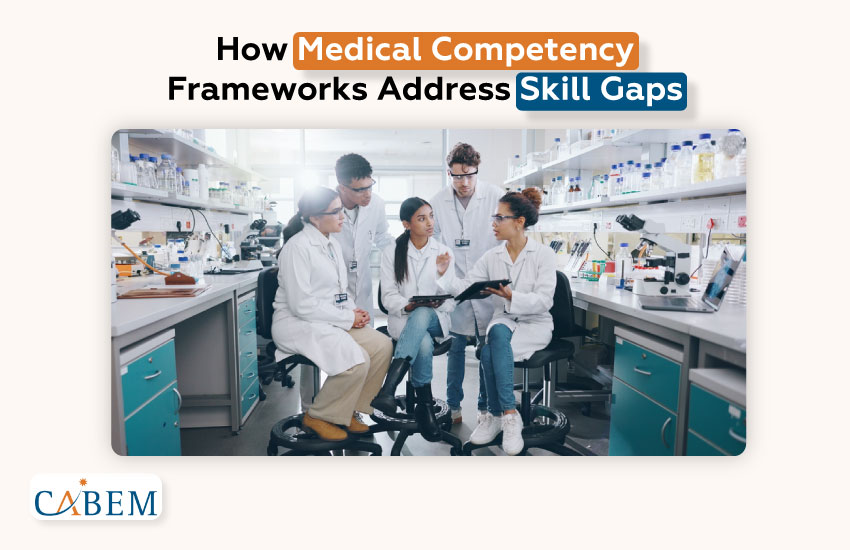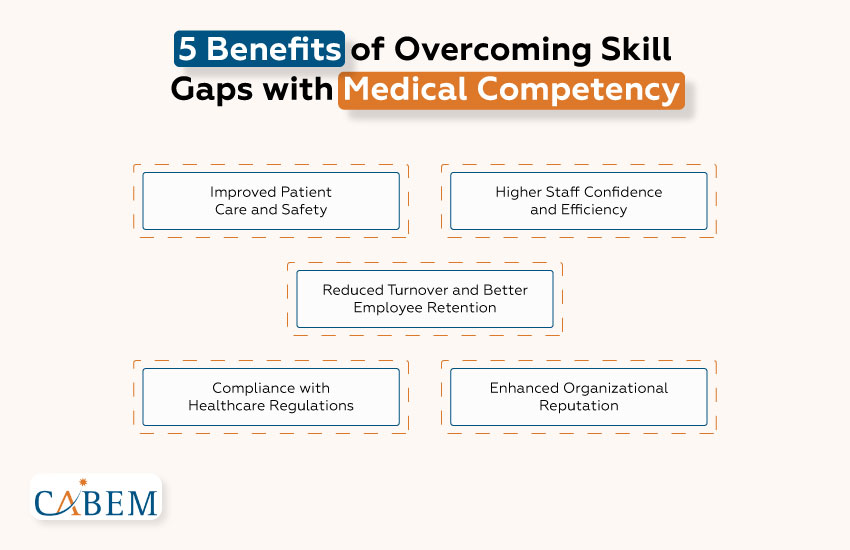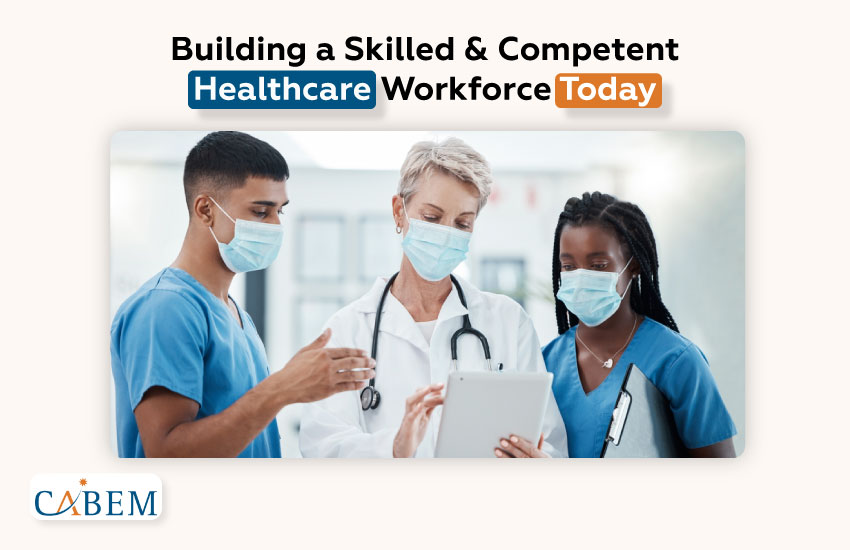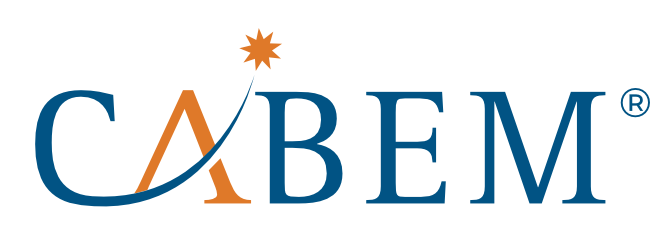Addressing skill gaps in the healthcare sector is critical for ensuring optimal patient care and operational success. At CABEM, we understand that skill gaps, when left unaddressed, can have far-reaching consequences—impacting patient safety, the quality of care, and the overall efficiency of healthcare organizations.
As the healthcare landscape continuously evolves with new technologies, treatments, and patient needs, your workforce must remain well-equipped to meet these challenges. Medical competency is a highly effective approach to bridging these gaps and enhancing workforce capabilities.
In this article, we will discuss why you need to address skill gaps in healthcare, describe medical competency, and show how medical competency frameworks can close the skill gaps in the healthcare workforce. We will also discuss the benefits of competency enhancement in your healthcare team and how it improves patient care and operational success.

The Importance of Addressing Skill Gaps in Healthcare
The healthcare industry is changing quickly as new technologies, treatments, and patient needs arise for healthcare professionals. Yet, the skill gap continues to be a big problem throughout the industry, with healthcare organizations unable to fill the gaps that the increasing requirement for quality care demands.
But why does closing skills gaps matter in health care? When these gaps remain unaddressed, they can lead to serious issues — clinical errors, patient dissatisfaction, operational inefficiencies, and exhaustion of healthcare staff. Apart from that, it can eventually increase operational costs and the compliance status of healthcare.
It is essential to explore strategies for closing these gaps, as the increased expectations for patient care will place unsustainable demands on the future healthcare workforce. This can be achieved with the CABEM medical competency framework to identify knowledge, skills, or performance gaps and address them with straightforward, actionable training programs.

What is Medical Competency?
Before discussing further details, let us first explain medical competency. Simply put, it is the ability of healthcare providers to execute their work with the essential level of skill, knowledge, and prudence in each of their actions, fulfilling the safety aspect of the patient and optimally achieving the best possible outcomes.
It is not just about theories but actual performance, making the right decisions in crucial situations, and applying knowledge and skills in appropriate medical environments. In brief, it incorporates the whole range of possible abilities that enable a healthcare worker to undertake services that are safe, efficient, and compassionate care.
In the healthcare field, competency is comprised of the following aspects:
●Technical skills: Proficiency in medical procedures, technology, and tools.
●Clinical reasoning: Acquiring the skills to make decisions based on patient information, understanding of medicine, and previous experience.
●Communication: Effectively and professionally interact with patients, families, and co-workers regarding clinical matters.
●Ethical practices: commitment to follow medical protocols and practicing ethical standards to ensure patient well-being.
When an institution adopts the CABEM competency manager, healthcare staff get an opportunity to develop and perform these aspects, ensuring that all team members can work collectively to provide high-quality services.
To gain better insight, check out our article, Why Every Healthcare Facility Needs a Competency Manager in 2024, to understand how a competency manager can be a game-changer for your organization.

Causes and Impact of Skill Gaps in Healthcare
To address the skill gaps in healthcare, it is crucial first to understand its causes and the broader effects.
Causes of Skill Gaps
Factors contributing to the skill gaps in the healthcare workforce are the following:
Aging Workforce
The retirement of elderly professional workers in healthcare results in a valuable loss for the industry. These losses result in gaps that are often tricky for younger employees to fill.
- The reduction of seasoned professionals means a reduction in sharing knowledge and mentorship
- Younger staff may not be trustworthy enough with the necessary experience for certain operations.
- More workload on other experienced employees
- Older healthcare workers hold the expertise and knowledge of the institution that new employees cannot possess.
Inadequate Training and Education
The world of healthcare is rapidly changing, introducing new technology, procedures, techniques, and treatment methods. Sadly, training programs don’t seem to be evolving alongside these changes.
- Healthcare staff are familiar with outdated skills or technologies, failing to embrace the latest trends.
- Training programs may be out of date or too basic.
- New methods and treatment strategies are not always incorporated into the courses.
- Hands-on training for some new equipment can be lacking when it should be implemented.
High Turnover Rates
There is a high turnover in healthcare organizations due to factors such as burnout, work dissatisfaction, and lack of morale. The organization hires new employees, constantly creating a skill gap.
- New employees are untrained or inexperienced.
- Overworked and burnt-out employees leave the field, which creates a shortage of skilled workers.
- Turnover, leading to team disturbance and decreased productivity.
- New employees make errors, which leads to inefficient operations.
Limited Professional Development
In some healthcare organizations, employees have little encouragement to further their professional knowledge. Without proper education or new skill-building, the workers become less productive.
- Staff might not receive the opportunities needed to upskill them.
- No apparent career growth results in employee dissatisfaction, increasing attrition rates.
Impact of Skill Gaps
Skill deficiency in the healthcare sector would create a deficit in service quality.
Some of these consequences include:
Increased Risk of Medical Errors
Insufficient training and skills deficiencies may result in mistreatment and errors that can endanger patient safety.
● Inadequate understanding of proper usage of medical services or equipment.
● Miscommunication among the medical staff results in errors.
● Not being able to complete procedures competently and causing a delay in providing care.
● Wrong information documented can affect patient care.
● Unable to follow specific procedures or standards.
Reduced Patient Satisfaction & Outcomes
Longer waiting times and incorrect treatment are some adverse effects patients are forced to endure due to the skills gap across the workforce.
● Patients wait too long to get treated.
● Poorly diagnosed and ineffective treatment options being selected.
● Tests and procedures that are unnecessary.
● Dissatisfaction of Patients
● Worse health condition or a late recovery
Operational Inefficiencies & Higher Costs
Healthcare organizations face delays, time and resource wastage, and increased costs due to poor utilization of skills.
● Completion of work takes more time due to the lack of mastery.
● Labour costs increase due to ineffective processes.
● Delays within the processes result in patient dissatisfaction.
● Rework or any other errors mean resources have gone to waste
● Organisational financial loss.
Burnout & Low Staff Morale
Covering for staff with skill gaps has been reported to cause healthcare professionals’ burnout and affect morale and job satisfaction.
● High levels of workload and stress
● Teamwork and collaboration are not at the best levels
● Reduced attachment to work and less active participation
● Higher turnover rates due to burnout
● Staff lose interest, and work pressure affects their performance.
Challenges in Meeting Compliance & Accreditation Standards
Lack of required skills can result in an organization being unable to meet regulatory obligations, resulting in compliance issues and loss of accreditation.
● Failure to meet the standards of safety or legal requirement
● Loss of accreditation because of low staff quality
● Increased risk of non-compliance penalties
● The organization is missing audits and inspections
● The elegance and trust of the institution is scaled down

How Medical Competency Frameworks Address Skill Gaps
So, how can healthcare institutions effectively close the skill gaps? CABEM medical competency framework can be the most practical method of solving these problems. These frameworks provide a comprehensive methodology to assess, train, and upgrade the competencies of individuals in healthcare.
Here’s how they can be used:
Identifying Existing Skill Gaps
Competency assessment and direct observation skills allow healthcare institutions to examine skill gaps in detail.
● Current competencies are assessed with skills assessment.
● Self-assessment and peer reviews for the most accurate deficit estimation.
● Feedback loops provided by supervisors and colleagues.
● Monitoring routine tasks and procedures.
● Regular surveys and questionnaires to find knowledge gaps that need to be filled.
Tailored Training Programs Based on Competency Assessments
After identifying skill deficits, healthcare institutions can develop customized training programs to meet those gaps.
● Training sessions that focused on the essential skill set required for each position
● On-job training that captured the challenges of the actual world
● Courses or workshops focused on general competencies
● Learning through simulation of high-stakes procedures
● Mentorship programs to facilitate skill and knowledge transfer.
Continuous Monitoring and Updates
Medical competency frameworks provide up-to-date skills while navigating the medical healthcare system.
● Frequent assessment of the competencies will be conducted
● Training programs will also be modified according to new procedures and technologies
● Continuous performance review to guarantee further enhancement.
● Arranging competency criteria in light of new regulations
● Feedback mechanisms to ensure the relevant skills possessed requirements of the institution

5 Benefits of Overcoming Skill Gaps with Medical Competency
Skill gap closure with the aid of CABEM healthcare credentialing and competency manager has various advantages for the healthcare staff and the whole organization.
Below are five significant benefits that accrue:
1. Improved Patient Care and Safety
Trained and skilled healthcare professionals provide proper quality care, minimizing error while enhancing patient care.
● Better patient care quality leads to improving patients’ satisfaction levels.
● Reduction in errors by the staff directly leads to increased patient safety
● Properly planned treatments and faster action
● Lower the number of complications and readmissions to the hospital
- Fact: The World Health Organization (WHO) estimates that 250,000 deaths each year are the result of medical mistakes, which ranks as the third foremost cause of death in the United States. This error can be limited to some extent through efficient training and proper competency frameworks, which also affects the safety of the patients in a direct way.
2. Higher Staff Confidence and Efficiency
Competence provides the necessary confidence level to healthcare workers, allowing them to perform their duties with much more vigor. This will enable organizations to achieve greater productivity and reduce mistakes.
● Confident staff ensure that tasks are undertaken and performed in the best way
● Greater efficacy shortens waiting times for patients to receive care and treatment
● Competent employees make it easier to handle difficult situations
● Employees feel more secure in their positions, which uplifts job satisfaction
3. Reduced Turnover and Better Employee Retention
Continuing growth and competency-based training enhance job contentment, lower employee turnover rates, and decrease hiring costs.
● Employees prefer to stay long in an organization that provides them with resources for their development
● Decreased turnover guarantees a smoother care provision along with a stable team
● Training enables organizations to have more dedicated and committed employees
● Training enhances employees’ spirits, reducing burnout and frustration
4. Compliance with Healthcare Regulations
To comply with regulatory requirements, healthcare organizations must develop a structured competency framework that provides a critical matrix to prevent costly fines and loss of accreditation.
● Assists healthcare staff in obtaining all necessary certifications and training
● Assists organizations in achieving positive results during audits and inspections.
● Avoids fines incurred for failing to meet healthcare compliance policies and regulations.
5. Enhanced Organizational Reputation
Healthcare organizations that make efforts to develop competencies and close skills gaps are regarded as the best, and in turn, they attract competent staff and earn an excellent reputation from patients.
● A positive reputation helps in attracting new and best-hiring
● Quality staff at the workplace builds trust in patients’ resilience
● They positively enhance the image of the organization
● Their superior service delivery improves their retention and recommendation rates
- Fact: As stated in Press Ganey, healthcare organizations with high patient satisfaction ratings have consistently demonstrated a strong correlation with staff competency and training. Trained staff members are more than 25% likely to find and retain properly qualified individuals in their respective fields. They also ensure that the organization continues yielding positive ratings, boosting its reputation in the marketplace.

Building a Skilled & Competent Healthcare Workforce Today
In the health sector, it is imperative to address skill gaps to ensure that patient care and workflow are efficient. In this regard, CABEM Competency Manager is designed to tackle skill shortages within medical institutions. Our medical competency frameworks allow the organization to assess, monitor growth, and even facilitate the development of competencies in real-time.
With CABEM Healthcare Credentialing and Competency Manager, you will be able to:
● Recognise and resolve all the skills gaps that exist
● Provide adequate and relevant training to the specific workers that require it
● Encourage a culture of continued learning so that your employees do not fall behind
Do not let skill gaps influence your care provision. Start building a more skilled and competent healthcare workforce today with the assistance of the CABEM Competency Manager.
Contact us to learn more and initiate changes within your healthcare team!
FAQs
1. Is the skill gap a pressing issue in healthcare today?
Yes, skill gaps in healthcare are a pressing issue today, exacerbated by the retirement of the senior workforce, the lack of new entrants, and technology outpacing. If left unaddressed, these gaps will lead to increased medical errors, work-related stress, and poor quality of care.
2. What exactly does medical competency involve, and how is it measured?
Medical competency means the capacity to provide safe and effective care with the required technical skills, clinical judgment, communication, and ethics. It is measured through the level of competency through performance assessments, direct supervision of practice, peer review of cases, and structured competent evaluations for determining strengths and areas for improvement.
3. What are the root causes of skill gaps in healthcare, and how do they affect patient care?
The skill gap in the healthcare sector results from factors like an aging workforce, inadequate training sessions, high attrition rates, and lack of opportunities to grow professionally. Increased skill gaps have the potential to impact patient care.

